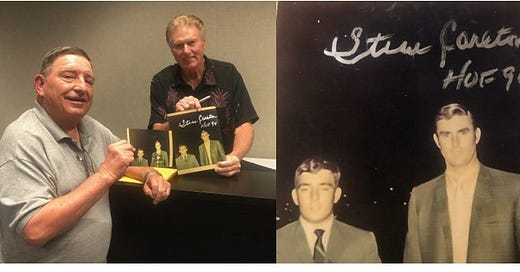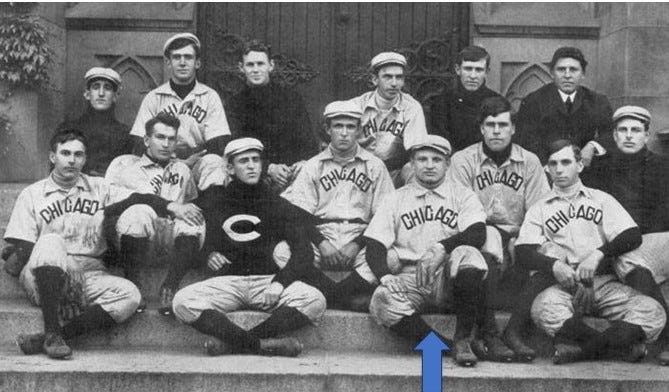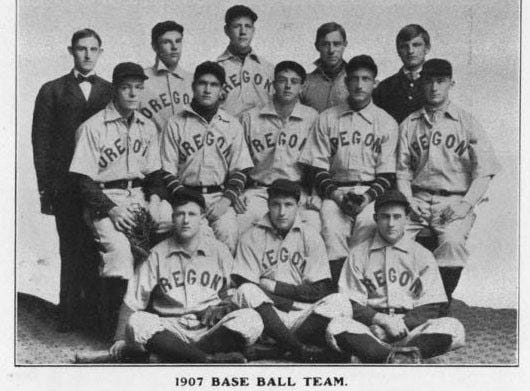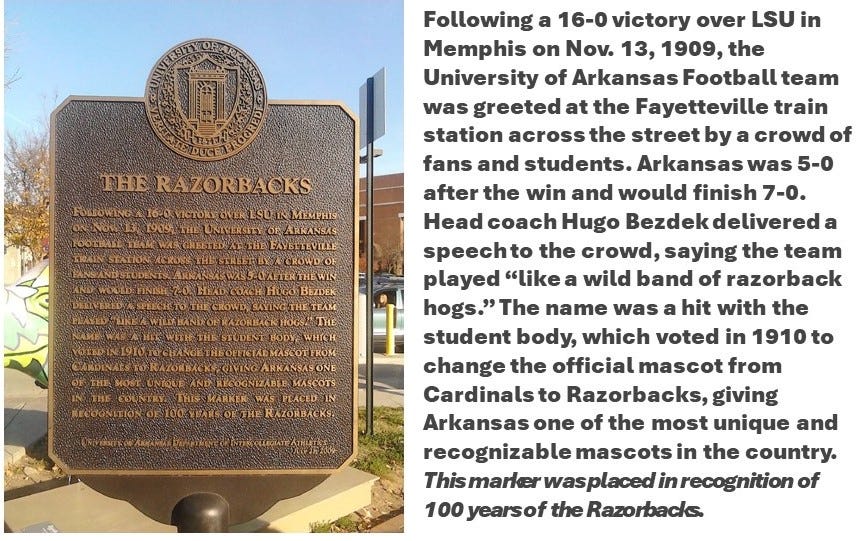Backroads and Ballplayers #21
Stories of the famous and not-so-famous men and women from the days when baseball was "Arkansas' Game." Always free and always short enough to finish in one cup of coffee.
Thoughts About Hot Springs Baseball Weekend, Favorite Baseball Stories, and Hugo Bezdek
Thoughts on Hot Springs Baseball Weekend
I spent Saturday at Hot Springs Baseball Weekend. It gets better every year.
The Arkansas Robinson-Kell Chapter hosted a special SABR meeting to open the day with a special presentation by local historian Mark Blaeuer.
Blaeuer’s interesting research about the Doan Baseball School was highlighted by several vintage newsreels that featured the instructors at the school in action (Dizzy Dean, Rogers Hornsby, Lon Warneke, and others).
President Madison McEntire reminded guests who attended the session that they are always welcome at Robinson Kell meetings. A contact address is posted at the end of this week’s column.
Baseball Stories

I am sure the crowd at this year’s event was among the largest ever for the annual Hall of Fame Weekend. The biggest change in my observation of this year’s attendees was that there were kids everywhere. That has to be a good sign for both the event and the future of the game.
Like most of my generation, I love baseball stories. I would not be surprised if every person at HSBW had one. In a lull in the action, Nashville, Arkansas’ Johnny Wilson told me his.
The year was 1968, and the All-Star game was at the Astrodome. Wilson’s uncle from Houston was a season ticket holder, and he got Johnny and his friend Randy White tickets to the game. The Cardinals’ young lefthander Steve Carlton pitched the sixth inning for the National League so his work was done early. When the game ended, Carlton had already showered and he was among the first players to leave the locker room.
Johnny and his buddy noticed the American League and National League charter buses parked on the street, so of course the young Arkansas guys lingered around the buses awhile. Surprisingly, Carlton stopped outside the team bus and chatted with Johnny and Randy. He mentioned that he had an early flight back to St. Louis the next day and the bus probably would not leave for the hotel for at least another hour.
Carlton said that if the Nashville guys were leaving, he would catch a ride with them back to Shamrock Hotel. Unlike today, no one carried a camera in 1968, but on that day Johnny Wilson did. Both young men took pictures with Steve Carlton.
A grateful Carlton arranged for Johnny and Randy to attend the All-Star reception in the hotel later that evening. The boys hung out until about 1:30 AM with the likes of Mickey Mantle, Willie Mays, and Hank Aaron.
At Hot Springs Baseball Weekend, fifty-five years after the adventure in Houston, the Hall of Fame pitcher signed reprints of the photo of a 21-year-old Johnny Wilson and a 23-year-old Steve Carlton, adding a fitting epilogue to the Wilson/Carlton story.
Hugo Bezdek - Baseball
Visiting after the meeting with Rick Schaeffer, former Sports Information Director at the University of Arkansas, reminded me of the “legend of Hugo Bezdek.”
I wrote a chapter in Hard Times and Hardball about Bezdek. Confining him to a chapter is difficult. It would take a full-length book and a few years of research to do Bezdek justice. In Arkansas, we tend to confine his legacy to the University of Arkansas’ first football success and an impromptu speech down on Dickson Street. Believe me, there is a lot more… (A more complete biography of Coach Bezdek can be found in Hard Times and Hardball)
Hugo Francis Bezdek immigrated from Bohemia (Czech Republic) with his parents when he was about five years old. The Bezdek family settled in the Chicago area where young Hugo immediately developed a love for American sports. He excelled at football, baseball, and boxing as a teen and later became a two-sport star at the University of Chicago under legendary coach Amos Alonzo Stagg.
He came to Arkansas in the summer of 1908 after a difficult year as the head coach at the University of Oregon and a year back at the University of Chicago attempting to become a doctor. Things had not gone well at Oregon. Although his teams were successful on the field, Bezdek had some problems. His players didn’t like him, he wasn’t very submissive to his bosses, and he wanted a raise before his first year was over.
Hugo Bezdek was about as warm and cuddly as Ty Cobb. Even for the tough world of 1906 athletics, his public relations skills were not very refined, or perhaps, he had not given much thought to the idea that not everyone thought like he did. There are not many interviews with Hugo Bezdek that begin with today’s common lead…“How do you feel about…,” but a few of his quotes reveal a young man dominated by his physical nature.
Sometimes I feel as if I was too much of an animal to be much good to myself or to others. My vitality is sometimes terrible to me. I crave action, pulling, mauling, hauling. I could have acted as a mule in a call boat or heave a rock but that would satisfy only the physical craving and not the desire for mental enjoyment. —Hugo Bezdek
For this post, I am going to discuss Hugo Bezdek the first official baseball coach at the University of Arkansas. Most Arkansas fans know him as the coach of the first football team called Razorbacks.
Having experienced (not necessarily learned) a valuable lesson at Oregon, Arkansas’ new coach visited several Arkansas towns and cities before arriving in Fayetteville. He had some personal image work to do. What he could not have known was that he was in the exact right place at the right time. Bezdek was about to encounter a group of motivated rural guys who were not only athletic but also as tough as razorback hogs.
It would be unfair to label Bezdek as a football player, hired to coach that sport, but required by contract to coach baseball in the spring. Although his best sport was football, Bezdek was good enough in baseball to be the starting second baseman and leadoff hitter for the Chicago Maroons’ baseball teams. His best year was his junior season when his .302 batting mark got the attention of local minor league scouts.
Bezdek was a football All-American at Chicago, but professional football at that time was virtually nonexistent. To continue to play pro sports after college, baseball was his only choice. Hugo not only loved baseball, he became a successful college baseball coach, and he eventually earned a shot as a big-league manager.

In February, after his 1908 football team had created some excitement on campus, Bezdek called for men interested in baseball to attend a pre-practice meeting. More than 70 prospects answered the call. His first team at the U of A would not only have a nucleus of quality players but an astute coach who had won the confidence of his athletes.
In the spring of 1909, Bezdek’s first Arkansas baseball team opened with a two-game sweep of Cumberland College (University of the Ozarks) in early April. The makeup of the opposing teams was an indication of the quality of baseball talent available in Arkansas. Between the two squads, 11 future professional baseball players participated in the series. Charles Tompkins, a lawyer’s son from Prescott, pitched a 6–0 win in game one, and John Vann, a descendent of the legendary Chief Vann of the Cherokee Nation, tossed an 8–0 shutout for the Cardinals in the second game. Both Arkansas pitchers would later reach the major leagues.
The 1909 baseball team finished the season 12—4. The record does not include a win, loss, and tie in a series in mid-April with the minor league Springfield Midgets. An exhibition game with a professional team became a feature of Bezdek’s creative scheduling. He included games with pro teams each of his seasons at Arkansas. The exposure provided by the games with pro teams opened the door to professional baseball for both Arkansas players and their coach.
The fall of 1909 was a benchmark period in the University of Arkansas athletic history. The football team went from an easy opponent to a feared rival in one short year. A 7—0 record included wins over Oklahoma and LSU, teams that had dominated the newly christened “Razorbacks” the previous year. The mythical story of Bezdek’s role in the selection of Razorbacks as the official mascot during the 1909 football season remains an integral part of his legend at Arkansas. Although he was not the first to call the Arkansas Cardinals “Razorbacks,” his endorsement of a wild hog as beautiful, fierce, and unyielding was the catalyst for the current mascot. And it is a good story, it is our story, and we have a monument down on Dickson Street to back it up!
Bezdek’s second baseball team lost four of their first five games in the spring of 1910, before righting themselves and producing another excellent record. The season produced some big victories including wins over Notre Dame and the University of Chicago on consecutive days, however, the year’s most talked-about baseball game was a loss.
On April 6, the U of A club traveled to Little Rock to play an exhibition game with the World Champion Pittsburgh Pirates. U of A ace Charles Tompkins pitched a complete game, and the story in the Arkansas papers the following day made the 8—0 loss read like an Arkansas victory. From the local sportswriter’s perspective, the highlight of the game was Tompkins’ strikeout of the great Honus Wagner. “Collegian Fans Mighty Wagner” was heralded in bold headlines.
The 1910 team won 9 of their last 10 games and finished 13-8-1 (13-7-1 vs. college teams). Bezdek’s Razorbacks declared themselves “Champions of the South.”
Hugo Bezdek had been courted by other major universities in the south during the spring of 1910 but decided to remain at the helm of the Razorbacks for the 1910–1911 school year. A 7—1 football record in the fall of 1910 solidified his place in Arkansas football lore and made the young coach one of the most sought-after coaching prospects in the country. Things were going well with Hugo Bezdek and the newly named Razorbacks were successful at both football and baseball, but all was not well.
Bezdek’s 1911 team would be the most successful baseball club in his five years at Fayetteville. The veteran team posted a record of 16—4 against college teams and a two-victory and two-loss mark versus pro teams. The Razorbacks lost to the Pittsburgh Pirates 12—2 on April 4 but won two of three over the Fort Smith Scouts of the Class D Western Association.
The 1912 version of the baseball Razorbacks played a typical Hugo Bezdek schedule which included losses to the American League White Sox and National League Pirates. Other losses included dropping a two-game series to the St. Paul Saints, a Class AA team from the minor leagues’ highest level. Against college teams, the nationally acclaimed Hogs won eight and lost three, with wins over Illinois, Notre Dame, and the University of Chicago.

Three more future major leaguers appeared in the Arkansas lineup. Boyd Cypert, a football standout in the fall, was the regular third baseman. Three years later, Cypert would strike out in his only major league at-bat. First baseman Roy Wood would eventually play in 119 major league games over parts of three seasons before returning to school to finish a law degree.
An unnoticed 17-year-old freshman, Sid Benton, made the 1912 team as a backup pitcher. Benton grew up just down the street from the Razorbacks’ home park, and although he did not get many chances on the mound during the 1912 campaign, he would become the fifth member of a Bezdek-coached team to reach the major leagues. Ten years later, in a forgettable one-game stint, Benton failed to get anyone out in his only big-league game.
By 1913 Bezdek was restless. The baseball Razorbacks opened their 1913 campaign with a two-game sweep of Fairmont College on March 28 and 29, but newspapers relegated the game results to minor stories below the headline, “Arkansas Will Lose Famous Coach.” Bezdek explained his choice was based more on ambition than salary. Although U of A officials publicly vowed to make improvements to keep their highly regarded coach, Bezdek would not change his mind.
“It is not money that I am after, it is the opportunity to develop myself and become an authority in my line of work.” —Hugo Bezdek 1913
Despite playing with the distraction of Coach Bezdek’s resignation, the 1913 Arkansas baseball team had another excellent season. The collegians came close to an upset of the Pittsburgh Pirates in early April, losing 3—2. The 1913 Hogs posted a 12—5 record versus college teams, including wins over Ole Miss and Christian Brothers of St. Louis.
Hugo Bezdek had spent five seasons coaching at Arkansas. His football teams had a combined record of 29—13—1, an excellent .686 winning percentage. Bezdek’s five baseball teams produced a cumulative record of 61 wins, 24 losses, and one tie. Coach Bezdek’s .715 is the highest all-time winning percentage among Razorbacks baseball coaches.
He is incorrectly credited in the Arkansas baseball media guide with 18 wins in 1908. He was a student-coach at the University of Chicago during that season. (Our unprecedented success was due to a large extent to the work of our coach, Vandergrift.” U of A Yearbook p.139)
His career at Arkansas was over before his thirtieth birthday, but more national fame was ahead. Hugo Bezdek would win a Rose Bowl, manage a major league baseball team, and coach a professional football team. He is the only individual to have managed in the major leagues and coached a pro football team.
He was inducted into the College Football Hall of Fame in 1954, The Arkansas Sports Hall of Fame in 1961, and the Rose Bowl Hall of Fame in 2022.
Coming this week: The mayor’s take on the Texas League Playoffs, Comparing Arkansas greats from the past “By the Numbers,” Schoolboy’s Lady, and of course, Jordan Wicks!
To receive information about the next Robinson-Kell meeting email Madison McEntire. - madcris@sbcglobal.net
If you missed earlier posts use this link to access back issues.
Please consider a subscription. It is the best way to be sure you get each post.










I guess as long as those two young men weren't sportswriters, Steve Carlton was good with them hanging around!